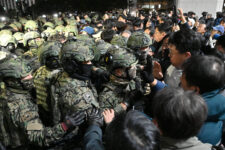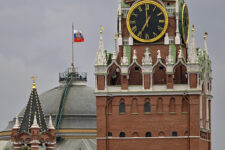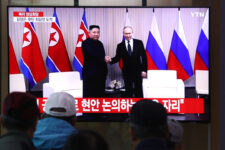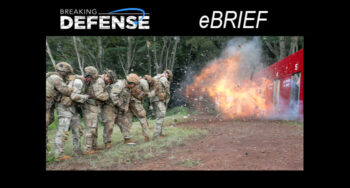
Ceremony for Gen. Mark Milley becoming Chairman of the Joint Chiefs with President Trump, VP Pence, and SecDef Esper.
PENTAGON: The Pentagon’s top lawyer has ordered the collection of all documents related to the Ukraine military aid at the center of the House impeachment investigation.
In a letter sent across the Pentagon, General Counsel Paul Nay directed officials to “preserve all documents, records, and writings, and any associated attachments, in any format,” that relate to the Ukraine Security Assistance Initiative, and direct any requests from outside the department Office of Information Counsel. The letter was made public today.
DoD spokesman Jonathan Hoffman told reporters Thursday that gathering the relevant materials is meant “to ensure that all appropriate department information is available on this matter,” adding that “DoD offices should provide any pertinent documents and records to the Office of General Counsel for cataloguing and review.”
House Democrats launched an impeachment investigation after a White House whistleblower flagged a July 25 conversation between Trump and new Ukrainian President Volodymyr Zelensky, in which Trump asked for a “favor,” suggesting an investigation by Ukraine of former Vice President Joe Biden and his son, Hunter. Biden is the Democratic front-runner to challenge Trump in next year’s presidential election. The administration had ordered a last-minute review of Ukrainian military aid, holding up its release for several months. Following the call and whistleblower complaint, the House Intelligence Committee’s chairman, Adam Schiff, asked for a copy of the Intelligence Community’s whistleblower’s complaint on Sept. 10. Congress was notified that the Ukrainian aid was released by the administration the next day.
Hoffman was unable to provide details on when Pentagon leaders were first made aware that the $250 million aid package had been frozen, or why. Some Republican lawmakers like Lindsey Graham have suggested the hold came at the behest of the Pentagon, which allegedly considered Zelensky an unknown quantity. However, DoD had certified in May that Ukraine had made enough progress on addressing corruption to allow the assistance to flow without worry.
The July 25 call came several days after Defense Secretary Mark Esper was confirmed for the job. Hoffman said Esper was not on the call, in which Trump asked Zelensky for “a favor” after Zelensky bought up the delivery of Javelin anti-tank missiles.
Hoffman downplayed the significance of the document scrub, calling it “a fairly standard practice that when there’s a significant level of congressional or [inspector general] interest in a matter.”
The type of paper and electronic files that will be swept up in the General Counsel’s effort include records and conversations held inside the building and with other agencies centered on the aid delay.
Asked why Esper was not on the Ukraine call, Hoffman brushed off the need for Esper’s involvement. “The secretary has an incredibly busy schedule, he doesn’t spend most of his days sitting in on other people’s phone calls,” he said.
Asked about the Ukraine situation late last month, the SecDef responded, “I’m not going to get into any of that right now. I’m trying to keep DoD out of politics.” Esper pledged at his first news conference to keep the Defense Department apolitical.
European Command chief Gen. Tod Wolters, speaking to reporters at the Pentagon on Thursday, said he has had “zero conversations” with foreign counterparts about military funding for Ukraine. “I haven’t had any conversations with my mil-to-mil counterparts or with anybody, about concerns over investments in the Ukraine,” he said.
One of the key pieces of equipment the Ukrainian government has been eager to receive, as evidenced by Zelensky’s comments during the call, are Javelin anti-armor missiles. Wolters said “you see a little bit of a bounce in the step of a Ukrainian soldier when he or she has had the opportunity to embrace this system that allows them to better defend their turf.”
Just hours after Wolters sang the praises of the Javelin, the State Department announced it had approved the sale to Ukraine of another 150 of the missiles along with related equipment worth up to $39.2 million. The weapon, State said in a release, will help Ukraine “build its long-term defense capacity to defend its sovereignty and territorial integrity in order to meet its national defense requirements.”
State approves $3.64B sale to Japan of air-to-air missiles
The possible sale of the RTX-made AMRAAMs includes up to 1,200 missiles.


























